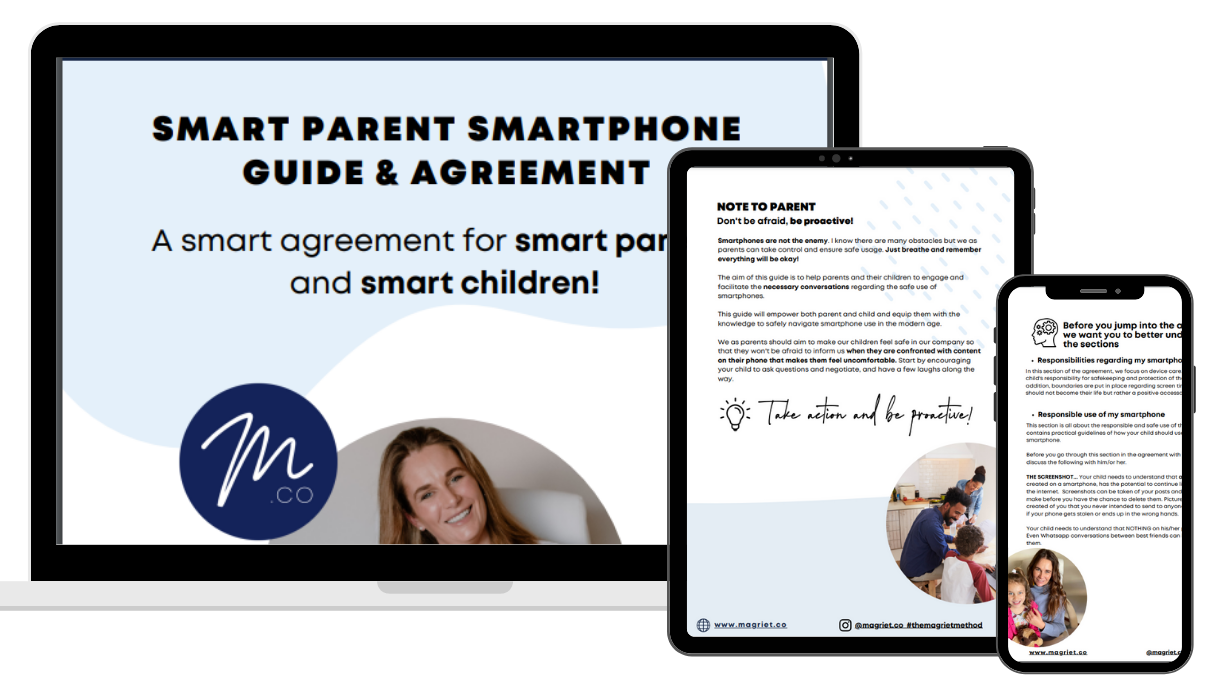
Get Your Free Kids & Smartphones Guide
Navigating the online world with our kids in mind can be tough. But hey, we've got your back!
Get your FREE Smartphone Smart Guide today – your ultimate tool for starting conversations about responsible smartphone use with your kids. It's time to empower them to make smart choices online.
FREE DOWNLOADfeatured on...




Social Media Law in South Africa
Article by Christiaan Groenewald - Admitted Attorney of South Africa.
Introduction
Social media platforms like Facebook, Instagram, TikTok and LinkedIn have become such an integral part of our everyday lives that we cannot even imagine a normal day without them. It has changed the way we interact and communicate forever and made virtual socializing a seamless experience that can be enjoyed with a click of a button.
Despite all the advantages of social media there are indeed a few pitfalls we need to avoid when using these platforms. The best way to do this is to stay informed and to know what the current South African legislation says with regard to specific online behaviors that have been criminalized. As we all know, ignorance of the law is not a defence and being informed is the best way to protect you and your children from ending up on the wrong side of the law.
A country's laws are in fact the tools that give effect to our rights as citizens of a country as enshrined in its constitution. It is ultimately there to protect us and not to punish us, so do not make the mistake of fearing the law. Rather embrace it as the legal compass for your and your children's lives and actions. Take some time to read up on legislation relevant to your industry and you will be amazed at how much you will learn from it. Then use it in your favour!
Position prior to 2020
Prior to 2020, there was no specific legislation in South Africa that regulated the use of social media. We had to look at the common law and the legislation that was in place at that stage, specifically the following Acts:
- The Protection of Personal Information Act 2013,
- The Regulation of Interception of Communications and Provision of Communication-Related Information Act,
- The Constitution of South Africa,
- Electronic Communications and Transactions Act,
- Promotion of Equality and Prevention of Unfair Discrimination Act,
- The Employment Equity Act,
- The Protection from Harassment Act,
- The Prevention and Combating of Hate Crimes and Hate Speech Act,
- The Consumer Protection Act,
- The Code of Advertising Practice (Advertising Standards Authority),
- The Copyright Act,
- The Trademarks Act.
Position after 2020
In 2020 however, the Cybercrimes Act, 19 of 2020 (hereinafter referred to as "the Act") was promulgated and this piece of legislation changed the social media landscape forever. This is the first real piece of legislation in South Africa that specifically focuses on behaviours in the online space including social media and also prescribes proper sentences for certain illegal digital and online activities including direct imprisonment.
The Act divides these activities into two categories, Cybercrimes and Malicious Communications. Some of the Cybercrimes identified in the Act are identity theft, cyber fraud, cyber forgery, cyber extortion and theft of incorporeal property.
For purposes of this article though, we will be looking at Malicious Communications (Part 2 of the Act) and I will refer to the sections relevant to social media use being sections 14, 15, 16 and 17.
Section 14 of the Cybercrimes Act
Section 14 of the act deals in particular with incitement of violence or damage to property. In terms of section 14, it is an offence if you disclose a data message to another person or group with the intention to incite, the causing of damage to the property of another, or acts of violence against another person.
An example of this offence would be for instance the forwarding of a Whatsapp message or email to someone else or to a group inviting them to join a violent protest.
Section 15 of the Cybercrimes Act
Section 15 deals with the act of threatening another person with violence or damage to their property. It is now an offence if you disclose a data message to another person or group which threatens the person or group with damage to property or with violence against that person.
An example of this offence can be something as basic as sending a Whatsapp message to another pupil at school in which the sender states that he is going to slap the other person or snap his pencil in half. He does not need to follow through on his threat. The threat alone is enough for the offence to be established.
Section 16 of the Cybercrimes Act
Section 16 of the act deals with the publishing of intimate images of a person by another. The image could be real or simulated, it does not matter! It is thus now an offence if you publish an intimate image of someone without his or her consent, whether the image is real, hand-drawn, computer-generated or in whatever way simulated.
This will again also include the forwarding of such content or sharing of a link to the content.
Section 17 of the Cybercrimes Act
Section 17 of the Act stipulates that anyone who attempts, conspires with, aids, instigate, instruct, incites, commands or procures another person to commit an offence in terms of the sections mentioned above will be guilty of such offence.
All the offences as contemplated in sections 14 15, 16 and 17 are punishable with a sentence of not more than 3 years in prison or a fine or both.
Criminal Capacity
The sections above are very clear on what constitutes an offence and as such if found guilty of a criminal offence. Apart from the devastating effects a direct prison sentence will have on an adult person we cannot even imagine the dire consequences for our children. In terms of the Criminal Justice Act, a child even as young as 10 years old may be found guilty of one of these offences. It is therefore of the utmost importance to educate our children about these criminal offences as soon as they possess the ability to understand the meaning thereof.
In terms of our Criminal Justice Act children under 18 have 3 different levels of criminal capacity that can be explained as follows:
- A child under the age of 10 years cannot be arrested. This means that a child under 10 years does not have criminal capacity and cannot be charged or arrested for an offence. In such a case, the child will be referred to the Children’s Court.
- A child older than 10 years but below the age of 14 years is presumed to lack criminal capacity unless the state proves that he/she has criminal capacity, in which case such a child can be arrested.
- A child above 14, but under 18 years of age, is said to have criminal capacity and can be arrested.
Conclusion
We as parents have the responsibility to, at all times, act within the best interest of our minor children. Take time to read and understand the relevant sections of the Cybercrimes Act yourself, then convey and explain the consequences of contravening these sections to your child.
Social media is not going to go away soon but one sure way of dealing with the dangers and pitfalls it poses is to make a real effort to always stay well informed and to be proactive in your child's education in particular when it comes to social media and the online world.

About Christiaan & Magriet
Christiaan is an attorney with 20 years of experience and Magriet is a Social Media Coach for business owners with a B.com Honors degree in Marketing. Together they make a great team covering social media and digital law.
"We are not only professionals but also parents and have so much compassion for parents as I know about the challenges we face when it comes to navigating the online world with our children in mind. "
Get your free Smartphone Smart Guide for parents.
FREE DOWNLOADNeed help setting up parental controls
- Parental controls for Apple products
- Parental controls for Google Play
- Parental controls guide for Chromebook
- Content restrictions for Windows 10 and Xbox One
- Parental controls for YouTube Kids
- Content filters on SafeSearch for Google
- Parental controls on Amazon FreeTime
- Parental controls on Netflix
WhatsApp and WhatsApp Groups: How To Stay Safe And Out Of Trouble.
Guidelines & Tips For Using Whatsapp

Whatsapp is truly an amazing app with which no one can live without. However, just like any other social media platform (Whatsapp is also classified as social media), and just like any other social media platform it can have negative consequences if not used correctly, like:
- Cost you your job or be expelled at school
- End up in prison
- Jeopardize your safety
- Ruin your reputation… forever
- Basically, it can ruin your life IF NOT HANDLED WITH CAUTION.
I am Magriet Groenewald, your favourite social media educator. I teach business owners & entrepreneurs how to become an authority in their industry using social media!
How can you and your kids stay safe on WhatsApp??? I want to share with you why you should be giving some attention to what you post on whatsapp and whatsapp groups.
You might be thinking wait… it can’t be as bad. Let me explain and help you how to stay on the safer side. I only truly understood this issue after reading a brilliant book by Social Media Attorney, Emma Sadleir on how the law in South Africa works with regard to social media. She explains that once you post something online or to only one other person (like sending a Whatsapp to only 1 person) that content is viewed in the same light as a newspaper publication. So in fact this means we (and our children) not only have the same POWER but also RESPONSIBILITY compared to any publication company like a newspaper or magazine. Now think for a second about that. A newspaper WILL NOT publish false or unverified facts in their articles. They will also not publish racial, defamatory, sexist eg. content as they will run the risk of being sued for damages.
So here are my guidelines on how to analyse and safeguard the content that you create digitally before posting.
Just another note… the screenshot changed the game. It is your worst enemy, because that message you sent to only one person without thinking can via the screenshot be shared to multiple recipients on different social media platforms before you can delete it. So, let's go:
- Digital content is dangerous! Do NOT create or store any digital content that you would not want the world to see. You might be thinking that this is ONLY for me, but what if your phone gets stolen? If there is any content on that phone that you do not want the world to see, because it’s digital you might run a risk of putting yourself in a very difficult position. So, remember if you do not want the world to see it DO NOT CREATE IT and if received DELETE IT (make sure it is also deleted from your cloud account).
- The billboard test: This tip I also learned from Emma where she explains that if you create digital content in the form of a Whatsapp or even just for your phone, consider if you are prepared to have that content published on a HUGE billboard next to the N1 with your face, your name, where you live and your school or employer’s name next to it. If the answer is no, do not create, share or save such content.
- Fact check before you share: Just as a newspaper double check facts before publishing an article, so it is expected from all of us to check the correctness of the facts contained in our posts. Do not spread videos or messages you do not have the facts on. By sharing fake news you are opening yourself up for civil claims being instituted against yourself.
- Keep it legal: If you are part of a Whatsapp group where illegal content is shared, eg. defamation, hate speech, racism, explicit and you do not clearly distance yourself from that content, you can be viewed as an accomplice. Even if it’s a joke.
- Keep content relevant: Do not share jokes or content that is not relevant to the purpose of a group. If its a work group. Keep it work related.
- Do not reply if it’s not necessary: Replies like “thank you”, ok, or emoji on a group can become a huge problem if there are many people on the group.
- Know when to take it off the group: If it’s a discussion between only 2 or 3 people on the group - take it off the group.
- If you feel emotional - stay off the group. Rather make an appointment to see the person.
- Consider other people’s time: use your common sense if it is work related, keep it in work hours.
- If in doubt be aware of the following guidelines:
a) Use common sense
b) Be respectful
c)Remember that if you would not say it to someones face do not publish it!
d) Remember the billboard test - If you ever feel unsafe: Share your LIVE location with a loved one so that they know where you are!

Get Your Free Kids & Smartphones Guide
We have so much compassion for parents as I know about the challenges we face when it comes to navigating the online world with our children in mind. Get your free Smartphone Smart Guide for parents. Use this guide as a conversation starter with your kids.
FREE DOWNLOADCONTACT US:
Email address: [email protected]